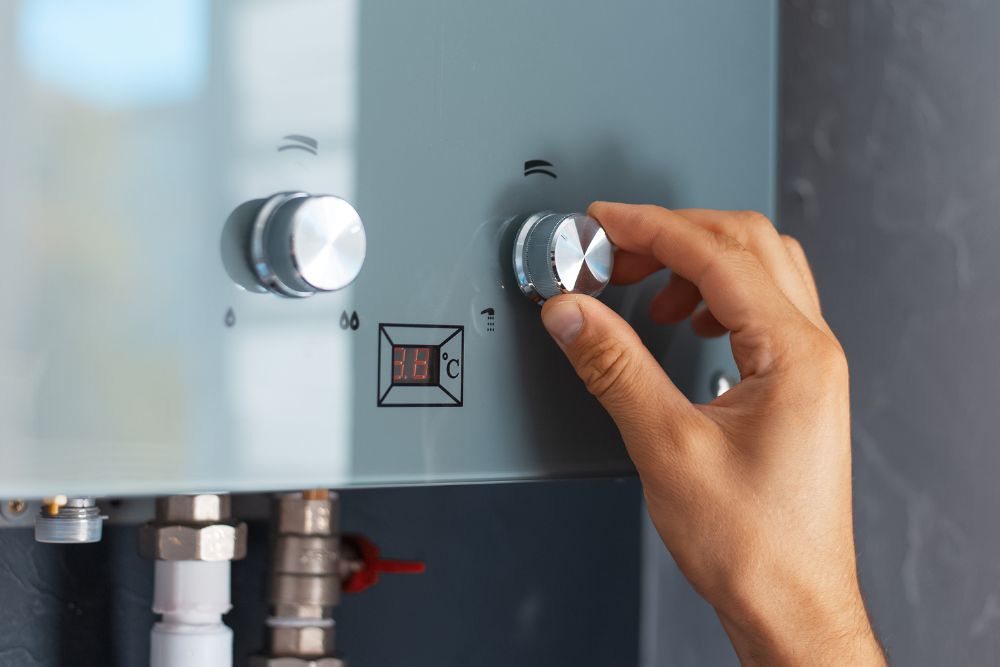
This Gas Water Heater Troubleshooting guide offers a systematic approach to diagnosing and resolving common issues associated with gas water heaters.
Covering a wide range of problems, from insufficient hot water to leaking tanks, it provides practical solutions and emphasizes the paramount importance of safety measures.
Also, it advises when professional assistance might be necessary.
As a comprehensive resource, this guide is instrumental in enabling homeowners to effectively maintain their gas water heaters, thereby extending the equipment’s lifespan and ensuring its efficient operation.
Key Takeaways
- Common gas water heater problems include insufficient hot water, no hot water, frequent pilot outages, and excessively hot water.
- Steps to diagnose heater issues include checking thermostat temperature, assessing water heater size, inspecting for loose wiring and sediment buildup, and calling a professional if issues persist.
- DIY solutions can be used for initial diagnosis, but serious problems often require professional expertise.
Understanding Your Gas Water Heater
One must first comprehend the basic operations of their gas water heater to effectively diagnose and troubleshoot potential issues. The heart of the gas water heater is the water tank, where water is heated by the gas burner. The pilot light, the small flame that ignites the gas burner, plays a crucial role in this process. This pilot flame is fed by the gas line, and any disruption in its operation can lead to problems with your heater.
Troubleshooting your water heater begins with understanding Common Reasons for failures. These can range from a poorly adjusted thermostat to a malfunctioning pilot light. If the water temperature is inadequate, consider gradually increasing the thermostat temperature. If there’s no hot water, check the pilot light and relight it if necessary.
For pilot light issues, ensure the thermocouple probe tip is inside the pilot flame and check for a clogged pilot orifice. If the water tank leaks, you may need to tighten or replace valves. Bottom leaks often require professional intervention. Regularly draining sediment from your heater can also prevent clogs.
Always remember, if the problem persists, don’t hesitate to contact your gas company.
Common Gas Water Heater Problems
Gas water heater malfunctions can be categorized into common problems that are frequently encountered by homeowners. These problems include insufficient hot water, complete lack of hot water, a frequently extinguishing pilot light, inability to ignite the pilot light, or excessively hot water.
These common gas water heater problems typically occur due to a variety of reasons. Identifying the underlying cause is crucial to rectifying the issue and ensuring the longevity of your gas water heater. Here are some common issues:
- Insufficient hot water: This could be due to a faulty thermostat, an undersized water heater, or sediment buildup in the tank.
- No hot water: The primary reasons for this issue include a defective gas control valve or a faulty thermostat.
- Frequent pilot outages: This could be caused by a faulty thermocouple, a loose or dirty pilot orifice, or a defective gas control valve.
- Water too hot: The usual culprits are an incorrectly set thermostat or a faulty thermostat.
When these problems persist after troubleshooting, it might be time to consider hiring a professional or replace the unit altogether. Understanding these common issues can help extend the life of your hot water heater and ensure a steady supply of hot water for your household.
Steps to Diagnose Heater Issues
Several steps can be taken to accurately diagnose and address the issues plaguing your gas water heater. This gas water heater troubleshooting guide provides a comprehensive list of steps to diagnose heater issues.
The first step involves checking if the thermostat is set at the right temperature. If it’s too low, you might need to increase it gradually. Avoid making drastic changes to prevent the risk of scalding.
Consider the size of your water heater. If it’s not adequate for your needs, you might need to replace it. A water heater that’s too small can struggle to meet demand, leading to frequent water heater problems.
Inspect your unit for loose wiring, bad connections, and sediment buildup. If these issues persist, you need to call a professional to resolve them.
Below is a summary table of the steps:
| Steps | Action | When to contact a plumber |
|---|---|---|
| Check thermostat | Increase gradually if needed | If thermostat malfunctions |
| Assess heater size | Replace if inadequate | If unsure of size |
| Inspect unit | Look for wiring issues, sediment | If issues persist |
If the steps in this guide do not resolve your issues, it’s time to call a professional. They can accurately diagnose whether repair or replace is the best course of action.
Practical Troubleshooting Techniques
In the realm of gas water heater troubleshooting, practical techniques play an essential role in diagnosing and resolving common issues. When dealing with a gas water heater, some common issues might include insufficient hot water, no hot water, or an excessively high temperature. Understanding the components involved, such as the pressure relief valve, drain valve, anode rod, and others, is crucial to effective troubleshooting.
To get started, consider these practical techniques:
- Inspect the Pressure Relief Valve: This is a safety device on all water heaters. It releases pressure when it gets too high. If this valve is defective, it could cause temperature and pressure issues.
- Check the Drain Valve: A leaking drain valve can cause inadequate hot water. Ensure it’s tightly closed.
- Examine the Anode Rod: This prevents rust by corroding itself instead of the tank. If it’s corroded, your water heater may need to be replaced.
- Assess Water Flow: Cold water enters your heater through a dip tube. If the tube is damaged, cold water may mix with hot, lowering the temperature.
Professional Repair Vs DIY Solutions
A significant number of gas water heater issues can be initially diagnosed using practical troubleshooting techniques, yet the decision between pursuing a do-it-yourself solution or hiring a professional gas fitter for repair presents a critical juncture.
Cold water instead of hot may indicate something wrong with your gas or electric water heater. Issues with the circuit breaker may be a simple fix, but serious problems like defective valves or leaks often require the expertise of a professional. DIY solutions can save money in the short term, but without years of experience, it’s easy to overlook potential hazards or misdiagnose the root cause.
It’s crucial to know when to call a professional. If the water heater is leaking or you smell gas, immediate professional help is necessary. These are serious problems that pose safety risks if not handled properly. A professional can make sure the repair is done safely and correctly, preventing further damage or potential disasters.

